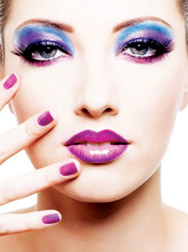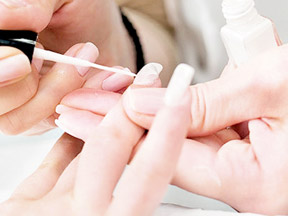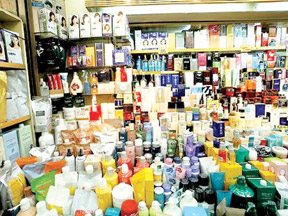Beauty - at what price?
Regulatory Authority to raid salons islandwide:
By Manjula FERNANDO
|

cosmetic product is ad |
'Beauty is in the eyes of the beholder', goes the old saying. But one
could not help but wonder if this still stands true, with the
painstaking efforts women and men make to 'look beautiful'.
A visit to a beauty parlour or the salon is no more a necessity among
the rich and famous. It has become so routine that the staff can read
the clients' whims and fancies with one look. And the places have long
evolved from their standard haircuts and facials to offer tailor-made
services. Highlighting, tinting, bleaching, perming, straightening to
mention a few if it concerns only the mane. Others include waxing,
bleaching, massaging, manicure and pedicure all of which cannot do
without the chemical based beauty products that have invaded our market.
But how many of you knew that 30 percent of the cosmetics currently
on sale in supermarkets, pharmacies and cosmetic shops do not have a
proper permit from the Cosmetics, Devices and Drugs Regulatory Authority
which is the sole State body that holds the power to check whether what
you apply on your skin does not contain harmful substances. This is
excluding the pharmaceuticals, functional food and dietary supplements
that are prescribed by so-called 'beauticians'.
So far the authorities had to turn a blind eye as to what went on
behind closed doors of these 'Salons' as they hardly possessed laws to
regulate their dealings, until recently.
The news of a woman's death due to an allergic reaction following
treatment in a beauty parlour, stirred a hornet's nest and jolted the
authorities into taking action.
Health Minister Maithripala Sirisena learned that the cosmetic laws
need more teeth to protect the consumers and customers and the penalties
under the existing law are just a joke. The fourth amendment to the
Cosmetics, Devices and Drugs Act of 1980 is now before the Legal
Draftsman's office and hence is expected to be presented expeditiously
in Parliament before the end of the year. It will enable the Authority
to regularly keep an eye on the booming beauty sector in the country.
 A
second Bill to set up a National Medicinal Drug Regulatory Authority, is
too being fine tuned by the Legal Draftsman to give wider powers to the
law enforcing body namely the CDDA. The Minister is keen that this Bill
too is presented in Parliament before the end of the year, the
Cosmetics, Devices and Drugs Regulatory Authority post Dr. Hemantha
Beneragama said. He said the arrangements are under way to conduct
islandwide raids on beauty parlours next month. A
second Bill to set up a National Medicinal Drug Regulatory Authority, is
too being fine tuned by the Legal Draftsman to give wider powers to the
law enforcing body namely the CDDA. The Minister is keen that this Bill
too is presented in Parliament before the end of the year, the
Cosmetics, Devices and Drugs Regulatory Authority post Dr. Hemantha
Beneragama said. He said the arrangements are under way to conduct
islandwide raids on beauty parlours next month.
"We will be inspecting the products they use to find if there are any
unlicensed products. Hygienic conditions of the parlours will also be
taken into consideration," he explained. Under the existing laws the
CDDA can arrest the owners and pursue legal action if they are found to
be using unlicensed products in their salons.
The CDDA could deploy authorised offices, provincial directors,
district directors, food and drug inspectors and medical officers of
health in the raids. According to Dr. Beneragama over 3,500 different
varieties of cosmetic products have been registered with the CDDA. But
according to a research by the Lanka Market Research Bureau, 30 percent
of the cosmetics available in the market are unlicensed. Many products
like fairness cream and night cream from countries like India, China,
Thailand are available in the country.
 These
low priced products are destroying the market for the genuine local
products because the imported raw materials for the cosmetics are highly
taxed. "We are in the process of designing a website for the CDDA. Once
it is activated, people will have free access to the licensed drugs and
cosmetics and devices within Sri Lanka. This way we hope to create
awareness so that people cannot be easily fooled." These
low priced products are destroying the market for the genuine local
products because the imported raw materials for the cosmetics are highly
taxed. "We are in the process of designing a website for the CDDA. Once
it is activated, people will have free access to the licensed drugs and
cosmetics and devices within Sri Lanka. This way we hope to create
awareness so that people cannot be easily fooled."
Dr. Beneragama said, at the moment they cannot regulate or monitor
the advertisements on cosmetics and devices to check and report if the
products they promote are authentic. "We have the purview to regulate
and monitor only medicinal drugs." Under our laws only drugs that can be
purchased over the counter like paracetamol, balms and herbal medicinal
drinks can be promoted via advertisements.
The laws in the offing however, will cover the cosmetics and
pharmaceuticals and others in this category as well. Once the amendment
is passed, hopefully by early next year, prior approval will be
mandatory before a cosmetic product is advertised via media. Commenting
on the disturbing trend of pharmaceuticals and health supplements with
numerous claims being promoted via electronic media, particularly
television, he said the regulation of such products cannot be done by
laws alone. "Ethics play a big role in this.
 The
media's contribution in creating awareness on bogus products made a big
impact and should be appreciated," Dr. Beneragama said adding that
however, some media houses were in the business of promoting products
that could be misleading as to their therapeutic claims. "With the
limited staff we cannot be watching each and every TV programme and
visit pharmacies, shops as well as beauty salons everyday. The
media's contribution in creating awareness on bogus products made a big
impact and should be appreciated," Dr. Beneragama said adding that
however, some media houses were in the business of promoting products
that could be misleading as to their therapeutic claims. "With the
limited staff we cannot be watching each and every TV programme and
visit pharmacies, shops as well as beauty salons everyday.
Self-regulation and the need to abide by own ethics is an important
thing." "We have to curb the practice of beauticians prescribing drugs
to their customers. We received complaints and the new laws will enable
us to take action when this distinction between the medical doctors and
beauticians are being violated."
However the new laws will have to be supported by capacity building
within the State testing institutions, the Sri Lanka Standards Institute
and the Industrial Technology Institute since many of the modern
cosmetics and nutrceuticals as well as devices cannot be tested for
verification of their claims, in laboratories here. Presently, certified
lab reports submitted by the manufacturer are accepted by the CDDA in
the case of imported products provided that the same product is allowed
in their domestic market. "It is our advice not to use unlicensed
products because no matter the therapeutic claims they offer, they could
carry carcinogens (cancer causing substances) that trigger skin cancer.
If the product is absorbed into the internal system, this can cause
liver and kidney damage.
The most common symptom, however, is hypersensitivity/allergy."
Nevertheless all cosmetic products, even those licensed, need to be
tested before individual-use because even the licensed products may be
allergic to certain individuals. Dr. Beneragama said some externally
used cosmetics, made only for the use of professionals are freely sold
in the market.
The products specifically indicate 'professional use only'. "But in
Sri Lanka these products are freely sold at supermarkets and shops. The
ad-hoc use of such products may lead to health complications." The
regulations in the draft amendments will curtail such practices as well.
Beneragama said his final advice for the public is not to get misled
by the dazzling advertisements and their claims which are mostly
deceptive, noting that the final result often than not will be a
long-term health complication and a 'fair skin' or 'smooth hair'. |

